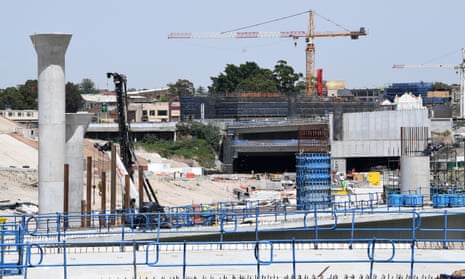A parliamentary review into WestConnex has found the project lacked transparency and the New South Wales government did not meet best practice requirements when developing the plan.
It also flagged health concerns about air pollution near schools, and said the privatisation of WestConnex allowed it to dodge transparency and reporting measures.
But despite the criticism, the committee’s chair, Christian Democrat Fred Nile, said the $16.8b project was too big to be stopped and was still “vital” to Sydney.
As part of the report on Monday, the Greens MP Cate Faehrmann issued a dissenting opinion that called for a halt to WestConnex, while the Liberal MP Peter Phelps wrote his own dissent that backed the project strongly and called protesters “whinging Baby Boomers and Nimbys”.
The $16.8bn project to construct a 33km roadway is Australia’s largest transport infrastructure project. It is projected to create $20bn in economic benefits but has come under fire for health concerns, disruption and the acquisition of people’s homes.
Monday’s review was scathing of the government’s behaviour in establishing the project, saying it “failed to subject WestConnex to a comprehensive independent assurance process”.
It found the business cases – published by the government in 2013 and 2015 to justify the plan – did not meet best practice, were “sub-optimal” and contained “major oversights”.
Privatisation also “weakened the accountability and disclosure rules” and “provided the government with a potential means to obscure its operations”, the report said.
But the mixed messaging of the report attracted criticism from anti-WestConnex residents’ groups and the committee’s own members.
Kathryn Calman, of the Coalition Against WestConnex, said the report “just doesn’t make sense”.
“It’s illogical,” she said. “On one hand it demonstrates a project that has gone rogue. On the other hand, it says ‘full steam ahead’.”
According to the review, WestConnex is roughly 50% complete and the cost of stopping construction now would be too costly.
“While the committee acknowledges the concerns … it remains clear that stage 3 must proceed,” it said. “The cost of stopping now would be borne by the taxpayers and would likely lead to the government having to withdraw planned investment in other areas … Stage 3 of WestConnex is strategically important to New South Wales.”
But David Watson, another protesting resident, said the state government should still cancel the project because it was “the right thing to do”.
“[The cost of cancelling] has been fudged to date,” he said. “When asked in the inquiry, the head of Transurban said ‘billions’. Now that’s a scary figure but let’s just say it’s $1bn.
“In Melbourne, four years ago, Daniel Andrews cancelled the East-West Link because it was a dog of a project. He paid back $780m. It didn’t seem to do his chances much harm at last month’s election did it? It was the right thing to do.”
The Labor, Greens and Liberal members of the committee all issued their own dissents as well.
Labor’s Daniel Mookhey and Greg Donnell said the report “should have been tougher on tolls”.
Faerhmann wrote that “WestConnex should never have been approved or built”. She also argued the cost of cancelling the project might be less than the cost of its negative impacts if it continued.
Phelps, one of two Liberal MPs on the committee, rejected the inquiry’s negative findings.
He described the inquiry as “a litany from anti-car Green extremists, whinging Baby Boomers, and Nimbys” full of “irrational and false testimony”.
“The 1,000 words for a dissenting report is too few to adequately express just how dreadful this inquiry was, and a large part of its resultant report,” he wrote.
The review, which received 557 submissions, also heard from the parent’s associations of Annandale North public school and Sydney secondary college in Balmain and Leichhardt who flagged health concerns about air pollution.
It also found that help for residents affected by loud construction noise was “wholly inadequate”.
St Peters resident Tamara Regan told the committee her family was given only foam earplugs and later a set of noise-cancelling headphones, after they could not sleep due to “concrete cutting saws, the jackhammering, the reverse beepers on trucks”.
The report recommended WestConnex install filtration systems on tunnels, and begin publishing all air quality data online.
It also recommended that, in future, all projects costing over $1bn should be subjected to public planning inquiries with independent review. The NSW Audit Office also plans to undertake an audit of the WestConnex project in 2019/2020.
